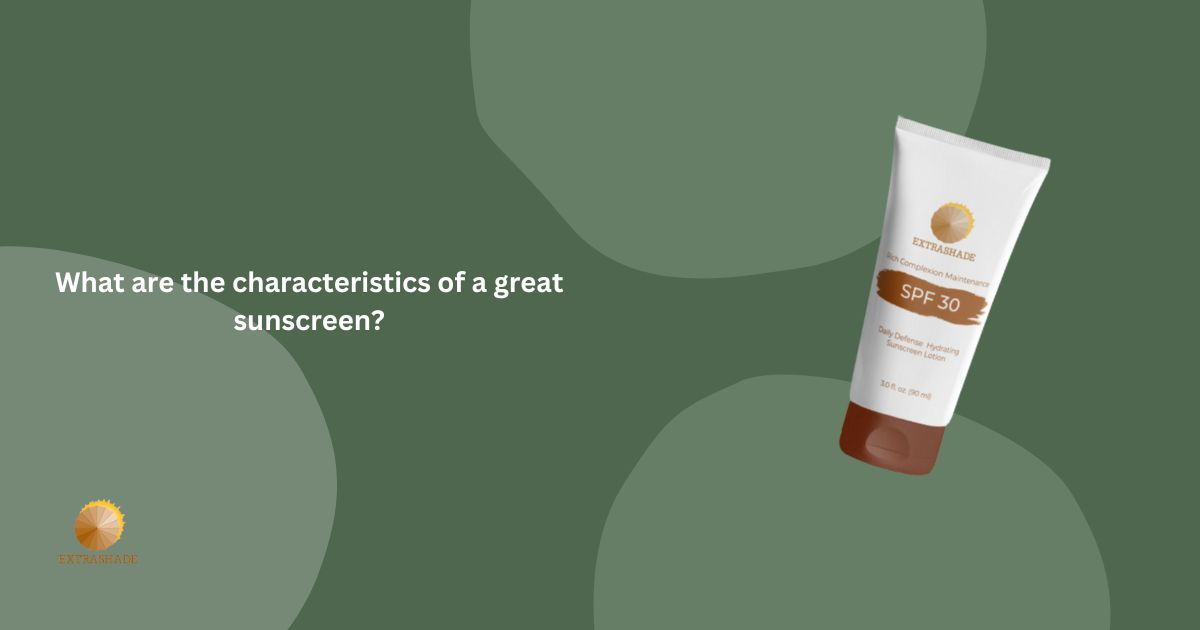Sun protection is essential for maintaining healthy skin and preventing premature aging, sunburn, and even skin cancer. But with so many sunscreen options available, choosing the right one can be confusing. Don’t worry, we’ve got you covered!
This article will outline the key characteristics of a great sunscreen, ensuring you select one that provides optimal protection and suits your individual needs.
What Is Sunscreen?
Sunscreen is a topical product that helps protect the skin from the harmful effects of the sun’s ultraviolet (UV) radiation. It works by absorbing, reflecting, or scattering the sun’s UV rays before they can penetrate and damage the skin cells.
The main types of UV radiation that can damage the skin are UVA and UVB rays. UVB rays are the primary cause of sunburns, while UVA rays penetrate deeper into the skin and contribute to premature aging and wrinkles.
Sunscreens contain active ingredients that provide protection against these UV rays. The most common active ingredients are:
- Chemical filters: These absorb UV radiation through a chemical reaction. Examples include avobenzone, oxybenzone, octinoxate, and octisalate.
- Physical filters: These reflect or scatter UV radiation from the skin’s surface. The most common physical filters are titanium dioxide and zinc oxide.
Sunscreens are available in various forms, including lotions, creams, gels, sprays, and sticks. They are labeled with a sun protection factor (SPF) number that indicates their level of protection against UVB rays. Higher SPF numbers indicate greater protection, but no sunscreen can block 100% of UV rays.
Using sunscreen regularly, along with other sun-protective measures like wearing protective clothing and seeking shade, can help reduce the risk of skin cancer, premature aging, and other UV-related skin damage.
Characteristics of A Great Sunscreen
Here are the characteristics of a great sunscreen:
I. Broad-spectrum protection
This is the most important factor to consider when choosing a sunscreen. Broad-spectrum sunscreens protect your skin from both UVA and UVB rays. UVA rays are the ones that cause premature aging, while UVB rays are the ones that cause sunburn. Look for a sunscreen that is labeled as “broad spectrum” or has a sun protection factor (SPF) of 30 or higher.
iI. High SPF
The SPF number tells you how well the sunscreen protects against UVB rays. An SPF of 15 blocks about 93% of UVB rays, while an SPF of 30 blocks about 97% of UVB rays. The American Academy of Dermatology recommends using a sunscreen with an SPF of 30 or higher for everyday use. However, even with a high SPF, it is important to reapply sunscreen every two hours, or more often if you are sweating or swimming.
III. Water resistance
If you are going to be swimming or sweating, you need to use a water-resistant sunscreen. Water-resistant sunscreens come in two varieties: 40 minutes of water resistance and 80 minutes of water resistance. Be sure to reapply sunscreen after swimming or sweating, and according to the directions on the label.
IV. Reef-friendly
Some sunscreens contain ingredients that can be harmful to coral reefs. If you are going to be swimming in the ocean, look for a sunscreen that is labeled as “reef-friendly” or “oxybenzone-free.”
V. Non-comedogenic
This means that the sunscreen will not clog your pores. This is important if you have oily or acne-prone skin.
VI. Fragrance-free
Fragrance can irritate some people’s skin. If you have sensitive skin, look for a fragrance-free sunscreen.
Conclusion
Prioritizing sun protection is vital for healthy skin. By keeping these characteristics in mind – broad-spectrum defense, adequate SPF, water resistance, and considering factors like application type and ingredients – you can choose a sunscreen that offers the best defense against the sun’s harmful rays.
Remember, consistent reapplication is key to maintaining sun protection throughout the day. So slather up, have fun in the sun, and enjoy the peace of mind that comes with knowing your skin is well-protected.
Frequently Asked Questions (FAQs)
What makes a sunscreen truly effective?
A great sunscreen offers broad-spectrum protection, shielding skin from both UVA and UVB rays. This ensures defense against sunburn, premature aging, and long-term damage.
How high should the SPF be for everyday use?
Dermatologists generally recommend SPF 30 or higher for daily wear, as it blocks about 97% of UVB rays while remaining comfortable for regular use.
Should a good sunscreen feel heavy or greasy?
No. Quality sunscreens are lightweight, non-greasy, and quickly absorbed. They leave the skin soft and breathable without leaving a white cast.
Is water resistance important in a sunscreen?
Yes, especially for outdoor activities or humid weather. A water-resistant formula maintains protection even when sweating or swimming.
Can a great sunscreen also improve skin health?
Absolutely. Many advanced formulas include antioxidants, vitamins, and hydrating agents that nourish the skin while providing UV protection.
Does sunscreen need to be suitable for all skin tones?
Yes. The best sunscreens blend seamlessly into all skin tones, ensuring no residue or gray tint, especially for melanin-rich complexions.
Is reapplication necessary even with a high SPF?
Yes. Reapply every two hours, or after swimming or sweating, to maintain consistent protection throughout the day.


